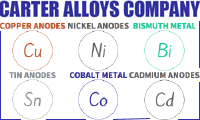
Curated with aloha by
Ted Mooney, P.E. RET

The authoritative public forum
for Metal Finishing 1989-2025

-----
Anodes for Silver Plating: Q&A Problems & Solutions
adv.: Supplier of Copper Anodes, Nickel Anodes, Bismuth Metal, & Other Metal Products for Industry & The Arts

RFQ: I would like to switch from silver slab anodes to popcorn style anodes to improve surface area. However, I need guidance on the type of basket material that would be used.
Lowell MoodyShop Owner - Watertown
September 7, 2022
privately respond to this RFQ
Ed. note: As always, gentle readers: technical replies in public and commercial replies in private please (huh? why?)
⇩ Related postings, oldest first ⇩
RFQ: Dear Sir;
We want to purchase SILVER ANODES: 2.990 Kg PURITY 99.99% Please send the quotation for mentioned material.
TRADING CO./ SUPPLIER - KANPUR, UP, INDIA
2005
Ed. note: This RFQ is outdated, but technical replies are welcome, and readers are encouraged to post their own RFQs. But no public commercial suggestions please ( huh? why?).
Silver anodes turn black
Q. We are doing Silver plating process on Nuts and bolts to make them anti-seize. Our Tank is Old and solution is checked and additions are made periodically to keep the contents within limits of Standards that we follow. The Tank was working okay in the past But recently we are facing a problem that the ANODE which is Pure 99% Silver starts getting a black film during plating. The black layer on Anode slows the deposit rate and we have to take out the Anode from the bath and clean it using an abrasive pad, rinse and again put it back. We have to do this 3 to 4 times in a 15 minutes plating operation. We have checked the bath for KCN and AgCN and their contents are within limit.
Please suggest any troubleshooting/remedial action?.
Plasma Shop Employee - Karachi, Pakistan
2007
A. Hi Muhammad,
Silver anodes can be available up to 99.97% of purity. Get that. Change the supplier if he cannot. 50% of your problem will be solved.
Now take care in the following areas:
1. Low free cyanide
2. Low pH
3. More current.
Muhammad why don't you mention the bath composition instead of mentioning "within limit" -- what is the limit!
There is a ratio of metal and cyanide. But first please let us know the "limit" you maintain! Then may be we will help you.
Try to post maximum details rather than leaving things for guessing.
Regards,

T.K. Mohan
plating process supplier - Mumbai, India
Q. Dear Mohan
Thank you for your suggestions. The Bath Make Composition is Four Chemicals are added in De-mineralized water. These are Potassium Silver Cyanide = 13 Oz.wt./gal, Potassium Cyanide = 10 Oz.wt./gal, Potassium Carbonate = 4 Oz.wt./gal, Potassium Hydroxide = 1 Oz. wt./gal.
Gallon is US gallon = 3.785 Liters.
pH value is 12.5 ,
The Solution Control Limits are:
Silver Metal = 6.0-7.5 Oz/gal [44.9-56.2 g/l], Present value 6.1 [45.7 g/l],
Potassium Cyanide = 6.0-9.0 Oz/gal [44.9-67.4 g/l], Present value 6.5 [48.7 g/l],
Potassium Carbonate = 4.0-16.0 [30-120 g/l], not checked recently,
Potassium Hydroxide = 0.5-2.0 [3.74-15 g/l], not checked recently.
We will look for a 99.97 Silver Anode in our local market. Meanwhile, based on the bath details, if you have any other suggestion please let us know.
Regards
Najeeb
Plating Shop - Karachi, Pakistan
A. Najeeb,
Can you convert these conc. into g/l!
I am leaving for a holiday. will be back on 15th
Regards,

T.K. Mohan
plating process supplier - Mumbai, India
----
Ed. note: g/l = oz./gal x 7.5. For readers' convenience we've added the conversions to Muhammad's posting in brackets.
A. Muhammad,
You should be careful in following areas if your chemical parameters are in range.
1.filtration of solution
2.quality of cyanide
3.current density
4.quality of water
5.pH of solution
Regards,
- Karachi, Pakistan
A. If these anodes were operating OK in this solution until now, then the problem is most likely in the solution. As you indicate that the current is also dropping it sounds like the anodes are polarizing so as your Free cyanide is at the lower end of your range I would try adding a couple of ozs/gal of Potassium Cyanide and see what happens.

Geoffrey Whitelaw
- Port Melbourne, Australia
A. Hi,
Your Anodes are impure, also not annealed and pickled after rolling. It is probably grease that comes out every 15 mins or so since it can be cleaned by an abrasive. please also check the operating voltage at the bus bars.

Deepak Whorra
silver craftwork - New Delhi, India
Inert anodes for silver plating?
Q. Hi. We've been using silver anode bars in our silver plating. Would it be possible to replace this silver anode bars into inert anodes? We also have existing problem with the increase in the carbonates in our bath. How do we deal with it?
Marylou BacordioProcess Engineer - Cebu City, Philippines
April 21, 2009
A. Hi, Marylou. It is possible to silver plate with stainless steel anodes, and some shops which primarily do thin silver strikes use stainless anodes. But it is usually less practical than using silver anodes if you do a lot of plating. A 3rd choice would be silver nuggets or "popcorn".
Regards,

Ted Mooney, P.E.
Striving to live Aloha
finishing.com - Pine Beach, New Jersey
A. Inert anodes causes carbonates to form.

Robert H Probert
Robert H Probert Technical Services
Garner, North Carolina

A. If your silver bath is sodium based, you can freeze out the carbonates to a degree. It is not a neat or complete process. If you use a potassium based bath, I do not know how you get rid of the carbonates.
James Watts- Navarre, Florida
Surya
----
Ed. note: see letter 473 for a good discussion of freezing out carbonates.
|
A. With potassium cyanide based baths a treatment of calcium nitrate will reduce carbonates to the desired level. I don't have the procedure in front of me, but I have used the process in the past with success. Your silver bath supplier should be able to furnish the treatment procedure for you. Mark BakerFellow Plater - Syracuse, New York, USA A. Stainless steel anodes cause quick rise of carbonates. Don't use them.  Sara Michaeli Tel-Aviv-Yafo, Israel |
|
A. I am about to treat our silver plating bath to get rid of potassium carbonate. I am going to use a product called Decarbonator salts SF20522, supplied by Macdermid. - Southampton, Hampshire, England A. Silver anode itself is a better option which will also reduce cost of production as proprietary silver salt or Silver pot. Cyanide will attract conversion charges as well as conversion loses!  T.K. Mohan plating process supplier - Mumbai, India |
Very pure silver anodes turn black anyway
Q. I am a supplier of silver anodes to different companies and I have my own melting shop to make these. But I regularly get complaints, that after introducing anode in bath, a few hours later there is some black ingredient coming out from the anode. The crucible which we use for melting silver is made of graphite. Are we using the right crucible or should we use silicon carbide crucible? And also, does graphite get concentrated with silver and result in contaminating the tank? Or is there some other reason for black formation? The most important thing is the testing shows purity of 99.9%.
Darshan Bothramanufacturer of silver anodes - Chennai, Tamilnadu, India
September 11, 2011
Q. Hello all,
When silver anodes are put into the silver bath (Potassium Cyanide base) the anode colour is white. After 5 hours or at the end of the day silver anodes become black. Why?
Is there any impurities in the silver bath or in the anode?
Suggest me.
Process Engineer - Tumkur, Karnataka, INDIA.
August 23, 2014
Silver anode turns black after awhile in a bath with sodium chloride
Q. I have a .999 silver plate that continues to get black after a while in solution. It also loses its original mass. How can this be prevented? As I would like to keep plating some things. Will I need to get a new .999 silver plate in the future?
ishmael smith- Columbus, Ohio, USA
June 29, 2016
A. Hi Ishmael. In silver plating, like most plating, the anode dissolves into solution; that is the source of the silver you are plating onto stuff.
But I don't understand "sodium chloride". This would generate insoluble silver chloride. Perhaps it was a typo or an auto-correct, and you were trying to say "silver cyanide"?
Regards,

Ted Mooney, P.E. RET
Striving to live Aloha
finishing.com - Pine Beach, New Jersey
Q. Hey Ted Mooney. Thanks for taking the time to reply to my question.
Is there any way to make the silver plates get back their original weight. I understand that some of it is being dissolved, but if I get another silver plate and place it in anode and take the worn out won as cathode will I be able to keep re-using my plates instead of buying new ones. I just would like to restore some plates.
Is there any possible method to do this, I would like to continue plating things for my wife since she would love to have plated utensils. I do not have the capability to buy more silver when it one at a time they wear out.
- Columbus, Ohio, USA
A. Hi Ishmael. You are trying to plate silver onto other objects. Where do you think this silver that you are plating onto other objects comes from? It comes from your silver plates. You can't put silver onto objects without supplying the silver.
Please explain exactly what solution you are using and the operating conditions you are using in trying to electroplate silver. Again, I don't understand the reference to sodium chloride; you certainly cannot electroplate silver using table salt; silver plating requires extremely poisonous cyanide which cannot even be considered for use by a hobbyist at home. Sorry.
Regards,

Ted Mooney, P.E. RET
Striving to live Aloha
finishing.com - Pine Beach, New Jersey
What is the best anode for silver plating, popcorn?
Q. What is the best anode for electrodeposition of silver on copper.
We have AgCN, KCN and K2CO3 in our bath.
Silver anode is expensive for us.
We are working on electrical elements.
Thank you very much,
- shiraz, iran
December 16, 2019
A. Hi mohammad. Yes, silver is expensive. But it is even more expensive to supply it as a plating salt than as an anode. You don't need to use cast anodes, though; you can use silver "popcorn" in baskets if that's more affordable and available. Good luck.
Regards,

Ted Mooney, P.E. RET
Striving to live Aloha
finishing.com - Pine Beach, New Jersey
A. The amount of silver plated on to a workpiece must be replaced, otherwise the plating solution goes out of balance and the silver content is depleted. The cheapest source of silver is silver metal, as silver salts cost about ten times that of their silver content.

Trevor Crichton
R&D practical scientist
Chesham, Bucks, UK
A. Hello Mohammad. Ted and Trevor had some great advice, just wanted to mention some advantages of using the "popcorn" type of anodes. Popcorn silver anodes have a greater surface area in bagged anode baskets because of their shape. Secondly , when the cast anodes get thin, in order to maintain your anode surface area you have to either add another full anode next to it or pull it and save it for reclamation. Most silver platers have basket funnels where adding the popcorn material is easier to top off the baskets. Just something to consider.
Mark BakerRetired - Winston Salem, North Carolina USA
Q, A, or Comment on THIS thread -or- Start a NEW Thread